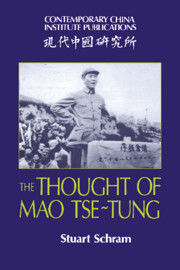Preface
Published online by Cambridge University Press: 23 December 2009
Summary
The body of this book consists of my chapter on Mao Tse-tung's thought down to 1949, already published in Volume 13 of the Cambridge History of China, and my chapter on Mao's thought from 1949 to 1976, which will appear in due course in Volume 15 of the Cambridge History. Some minor editorial changes have been made, but it has not been possible, because of technical constraints, to modify the text at will, especially in the first half of this book. As a result, the account of Mao Tse-tung's thought which follows remains very largely a summary and analysis of his ideas. Though I sought wherever possible to relate these succinctly to the circumstances in which they were elaborated, it would not have been appropriate, in the original context, to deal at any length with historical facts covered in other chapters of the larger work, even in the case of events which decisively influenced Mao's own intellectual development.
It is the purpose of the Introduction and Conclusion, which have been written specifically for this book, to compensate for these omissions, and to situate the development of Mao's thought in a wider framework. The Introduction takes up, first of all, the problem of the nature of the process of revolutionary change in China in the twentieth century which Mao Tse-tung sought to master, and the factors which enabled him to play the role he did. It then examines the relation between phases in Mao's life, and turning points in his thinking.
- Type
- Chapter
- Information
- The Thought of Mao Tse-Tung , pp. vii - xPublisher: Cambridge University PressPrint publication year: 1989

